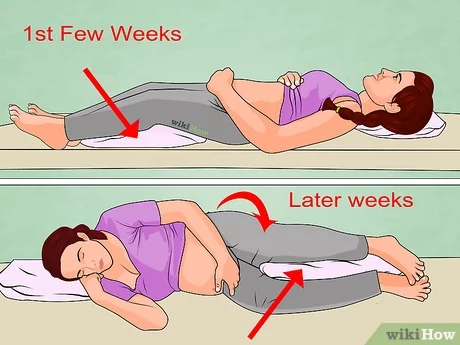Contents
- What does resting mean exactly?
- Why do we decide to bed a mother-to-be at the start of pregnancy?
- Why do we decide to bed a future mother in the middle of pregnancy?
- Why do we decide to bed a future mother at the end of pregnancy?
- What is the point of lying down?
- In general, how long do you lie down?
- Can we move, do exercises?
- What are the repercussions of a long pregnancy on the body?
- How to cope better with a bedridden pregnancy?
- Bedridden pregnancy: can we get help?
What does resting mean exactly?
Depending on the women and their condition, the rest is very variable. This ranges from a simple work stoppage with a normal life at home to a partly lengthened rest (for example, 1 hour in the morning and 2 hours in the afternoon), or even a completely lengthened rest at home until hospitalization ( rarer cases). Fortunately, more often than not, doctors or midwives prescribe “simple” rest with hours when you have to lie down.
Why do we decide to bed a mother-to-be at the start of pregnancy?
A poorly implanted placenta that causes bleeding with confirmation of the diagnosis by ultrasound can lead to bed rest. The mother-to-be must rest to avoid an increase in the hematoma due to the placenta detachment. Another cause: in the event of a cervix that closes poorly (often linked to a malformation), we will practice a cerclage – we close the cervix with a nylon thread. While waiting to practice it, we can ask the mother to remain bedridden. Afterwards, she will also need some rest.
Why do we decide to bed a future mother in the middle of pregnancy?
Because several signs suggest that childbirth could take place before time: it is a threat of premature delivery. To avoid it, rest is prescribed to stop the contractions that are too strong. The lying position means that the baby will no longer press on the cervix.
Why do we decide to bed a future mother at the end of pregnancy?
Most often, it is to reduce the effects of a complication of pregnancy, such as hypertension. At first, rest at home is enough. Thereafter, hospitalization is possible.
For multiple pregnancies and even twins: rest is essential. Also, the work stoppage usually occurs during the 5th month. This does not mean that the mother-to-be will be forced to spend the rest of her pregnancy completely lying down.
If the fetus does not develop well (growth retardation in utero), the mother is advised to remain bedridden and especially to lie on the left side to allow better oxygenation of the placenta and therefore to feed the fetus as well as possible. .
What is the point of lying down?
A matter of gravity! The lying position avoids too much pressure on the neck, encountered when the body is vertical.
In general, how long do you lie down?
It all depends on the state of health of the future mother, that of the baby of course and the term of pregnancy. Usually, it lasts between 15 days and a month. The rest is therefore temporary. Cases of fully extended pregnancy (7/8 months) are extremely rare. It is therefore not because a pregnancy begins with difficulty that it will end in length. It is always transitory.
Can we move, do exercises?
This obviously depends on the prescribed rest. Do not hesitate to ask the doctor or midwife following the pregnancy if you can go for a walk, do the shopping, do the housework… or if, on the contrary, you really need to slow down. In the most supervised cases, if the midwife comes to do home monitoring, she is the one who indicates what we can afford. She generally advises a few movements that do not require moving, in order to improve circulation and relieve the ailments associated with bed rest.
What are the repercussions of a long pregnancy on the body?
As we do not move, the muscles “melt”, the circulation in the legs stagnates, the belly grows. The spine is also strained. Physiotherapy is therefore desirable even during pregnancy and of course afterwards, in cases where lying down is recommended.
How to cope better with a bedridden pregnancy?
It is true that this period is not easy. Many mothers take the opportunity to prepare for the arrival of the baby (thank you for the catalogs and the wifi!). For those who have more strict medical rest, a midwife comes home. In addition to its role of assistance and medical control, it reassures women, easily weakened during this period, and helps them to better prepare for childbirth.
Bedridden pregnancy: can we get help?
Town hall, General Council and Medico-Social Center can help future mothers “cloistered” at home. In addition, it is possible to approach maternity hospitals which work with a whole network of professionals (obstetricians, midwives, psychologists, family workers, household helpers, etc.) who can also help them.










